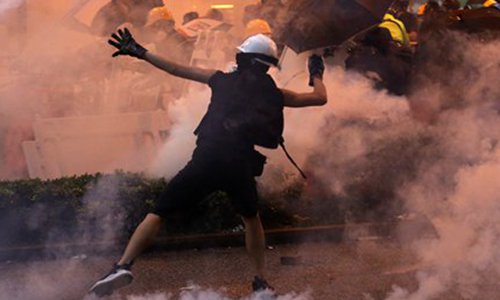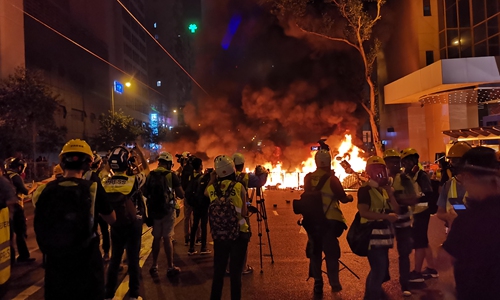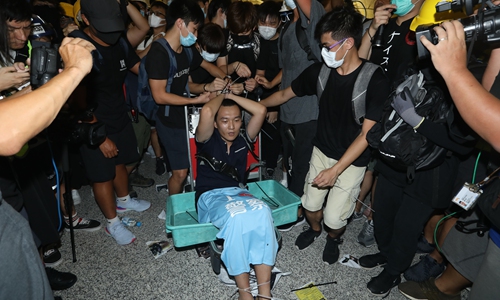Pulitzer Prize loses reputation in China by awarding one-sided report on HK turmoil
By Yang Sheng Source:Global Times Published: 2020/5/6 20:42:04

A Hong Kong protester throws a tear gas grenade at police. Photo: Cui Meng/GT
The most influential annual prize for US journalists has once again showed the double standards and bias of mainstream Western media, and it has lost its reputation among the Chinese public, as the 2020 Pulitzer Prize Winner in Breaking News Photography was awarded to Reuters, which delivered extremely one-sided information about the Hong Kong turmoil in 2019.
The awarded works from Reuters include photos on the violent conflict between the rioters and Hong Kong Police. But they only put up the ones that make rioters look like victims and show the moments of police law enforcement looking violent. Even if there were a few photos which showed the illegal activities of the protesters, such as attacking ordinary people, the captions still tried to imply the victims were not innocent since they were "pro-China" or "pro-Beijing."
Chinese people expressed their anger and disgust on social media, criticizing and satirizing the Pulitzer Prize by posting pictures showing violent rioters and innocent Hong Kong residents with comments like "this one is more qualified for the award."
Some web users also posted pictures showing Western journalists only pointing their cameras at the police rather than the rioters, as well as pictures that showed US and other Western countries' police using violence against civilians at protests.
The hashtag "Pulitzer Prize 2020" received 11.7 million views as of Wednesday on Sina Weibo, and almost every comment showed Chinese netizens offended by the Breaking News Photography award.
"If those Hong Kong rioters met US police, they would probably have gotten shot. They [Pulitzer Prize and Reuters] are probably showing how merciful the Hong Kong police officers were," read a comment on Sina Weibo with more than 500 likes.
During the Hong Kong protests in 2019, hundreds and even thousands of people including police officers, journalists, tourists or students from the mainland and innocent Hong Kong residents were attacked by anti-government rioters, and public facilities like subway stations, traffic lights and street lamps, as well as stores, banks and restaurants were vandalized by the protesters.
Kennedy Wong Ying-ho, solicitor at the Supreme Court of Hong Kong, told the Global Times on Wednesday that "In the past, we used to believe the prize was very creditable and showed the professionalism of US journalists. But now, as a Hong Kong resident, I found they have completely abandoned principles of balance, honesty and neutrality to serve political correctness and even the US strategy for major power competition with China."
"The jury committee of the prize only needs the photos that can stigmatize and smear China and Hong Kong police. They don't care about balance and neutrality," read another comment on Sina Weibo.
One of the awarded photos showed a bleeding man attacked by "a masked anti-government protester" with a hammer at the Mong Kok area of the city on November 11, 2019, but the official website of the prize stressed the injured man was "suspected of being a pro-Beijing activist" from the mainland.
Eric Lee, 42, a Mong Kok resident angered by the photo, said, "I was witnessing the incident that day. That man was just a tourist who just wanted to return to his hotel. But he was stopped by those radical rioters, and he couldn't speak Cantonese. He said nothing about politics, and was scared. How could this kind of photos and narrative get awarded?"
During most protests in the city last year, whether mainland people or the locals, as long as they hold different political opinions with the protesters, they would be in serious danger and could be treated with extreme violence.

Hong Kong protesters set fires, which caused small explosions and heavy smoke, in Wan Chai on August 31, 2019. Photo: Yang Sheng/GT
An old man surnamed Li was burned and almost got killed by rioters on November 11, 2019 at a subway station, only because he argued with the protesters who illegally stopped him from using the subway. This was widely reported by the media at that time. But some Hong Kong media and foreign media outlets showed less interest in reporting the tragedy. A web user said on Sina Weibo, "Is the Pulitzer Prize Board too blind to see this kind of shocking moment?"
Alfred Wong, who closely followed the Hong Kong protests in 2019, told the Global Times that "the Pulitzer Prize always represents the political correctness of the West. The awards are dominated by liberal political values or ideology, instead of facts and the principle of neutrality."
Alfred Wong, who also has US journalist background, said "In order to chase that previous Pulitzer Prize - a guaranteed shortcut to a successful journalism career in the US, many foreign journalists in China can't help but abandon any journalistic ethics and pander to the obsolete misconceptions and inherent ideological bias in the US society toward China, rather than challenging those dangerous inclinations with objective reporting."
An awarded Reuters photo also showed rioters using bricks against the police during the illegal assemblies. A 70-year-old man surnamed Luo was hit by a brick thrown by rioters on November 13 and died. He was the first victim during the months-long turmoil, but none of Reuters' awarded photos showed this.
Another awarded Reuters photo showed an angry woman with a Chinese national flag surrounded by protesters, which implied that the people who disagree with the protesters are cynical but the protesters are calm.

Hong Kong rioters tied Global Times reporter Fu Guohao to an airport trolley and beat him after falsely claiming he was a fake reporter. Photo: AFP
A mainland student at the Hong Kong University surnamed Wu who witnessed the attack by rioters against Global Times reporter Fu Guohao at the Hong Kong International Airport on August 13, 2019 on TV asked why "the Fu photo was not awarded. Again, they are pretending to be blind even if the world saw how brutal the rioters were that night."
The 2020 Pulitzer Prize for International Reporting awarded the New York Times for "a set of enthralling stories, reported at great risk, exposing the predations of Vladimir Putin's regime," according to the prize's website.
However, the Russian Embassy in the US said on Facebook on Tuesday that "We consider this series of articles by the New York Times about Russia an excellent collection of undiluted Russophobic fabrications that can be studied as a guide for creating false facts."
The Pulitzer Prize in recent years covered multiple issues, including US immigrant problems, the Syrian civil war, the Europe immigrant crisis and the Philippines' campaign against drug cartels. But most of them only provided a one-sided perspective. For instance, they glamorized the rebel forces in Syria as freedom fighters in 2013 but ignored their extremist backgrounds and the Western intervention that seriously harmed the sovereignty of the countries.
The 2017 prize for Breaking News Photography awarded a group of works about the Philippines' campaign against drug cartels launched by President Rodrigo Duterte, and these works said the Filipino people were suffering from this horrifying campaign, but failed to tell the need to fight the drug problem in the country.
The Pulitzer Prize is not the only one that could spark divergence between the Chinese public and Western political correctness. The Nobel Peace Prize also showed a double standard on anything about China, Russia or other non-Western countries, said Kennedy Wong.
"Although we disagree with Donald Trump on many issues, when he criticized some Western media with terms like 'fake news,' we found he might have gotten it right to some extent," Kennedy Wong noted.
Posted in: SOCIETY,HK/MACAO/TAIWAN